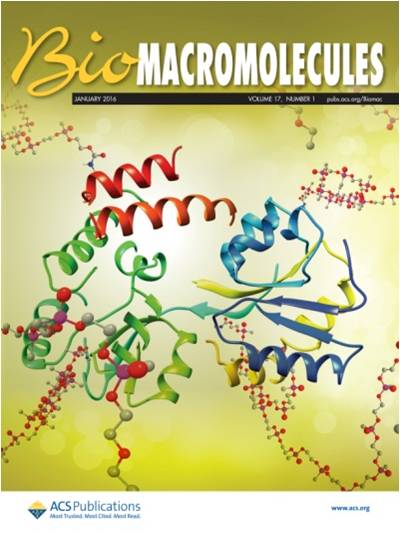
Polymer conjugation can affect nanoscale protein fluctuations.
Daniela Russo (team (nano)materials for energy), in collaboration with colleagues from Mainz, Perugia and Grenoble, has published an article entitled «Investigation into the relaxation dynamics of polymer-protein conjugates reveals surprising role of polymer solvation on inherent protein flexibility» in the journal BioMacromolecules. This article was selected for cover.
 In the present paper we address the effects of polymer conjugation on protein dynamical fluctuations on the nanosecond timescale. We analyze the dynamical properties of proteins conjugated with polymer in order to better understand the relative importance of molecular mechanisms related to hydration water versus bio-compatible materials. Using neutron scattering spectroscopy we present the investigation of the dynamics of a new class of polymer-protein conjugates, i.e. protein conjugation with fully degradable and highly water-soluble polymethyl ethylene phosphonate. The highlight of our work is presented in the experimental investigation performed with partially deuterated conjugates at two different polymer molecular weights. Here we describe for the first time that polymers do not promote a dynamical transition in absence of hydration water and that the length of the polymers within the conjugate is important for the degree of the protein flexibility in the dry and hydrated state. We discuss these findings in the context of protein environmental dynamics.
In the present paper we address the effects of polymer conjugation on protein dynamical fluctuations on the nanosecond timescale. We analyze the dynamical properties of proteins conjugated with polymer in order to better understand the relative importance of molecular mechanisms related to hydration water versus bio-compatible materials. Using neutron scattering spectroscopy we present the investigation of the dynamics of a new class of polymer-protein conjugates, i.e. protein conjugation with fully degradable and highly water-soluble polymethyl ethylene phosphonate. The highlight of our work is presented in the experimental investigation performed with partially deuterated conjugates at two different polymer molecular weights. Here we describe for the first time that polymers do not promote a dynamical transition in absence of hydration water and that the length of the polymers within the conjugate is important for the degree of the protein flexibility in the dry and hydrated state. We discuss these findings in the context of protein environmental dynamics.


















